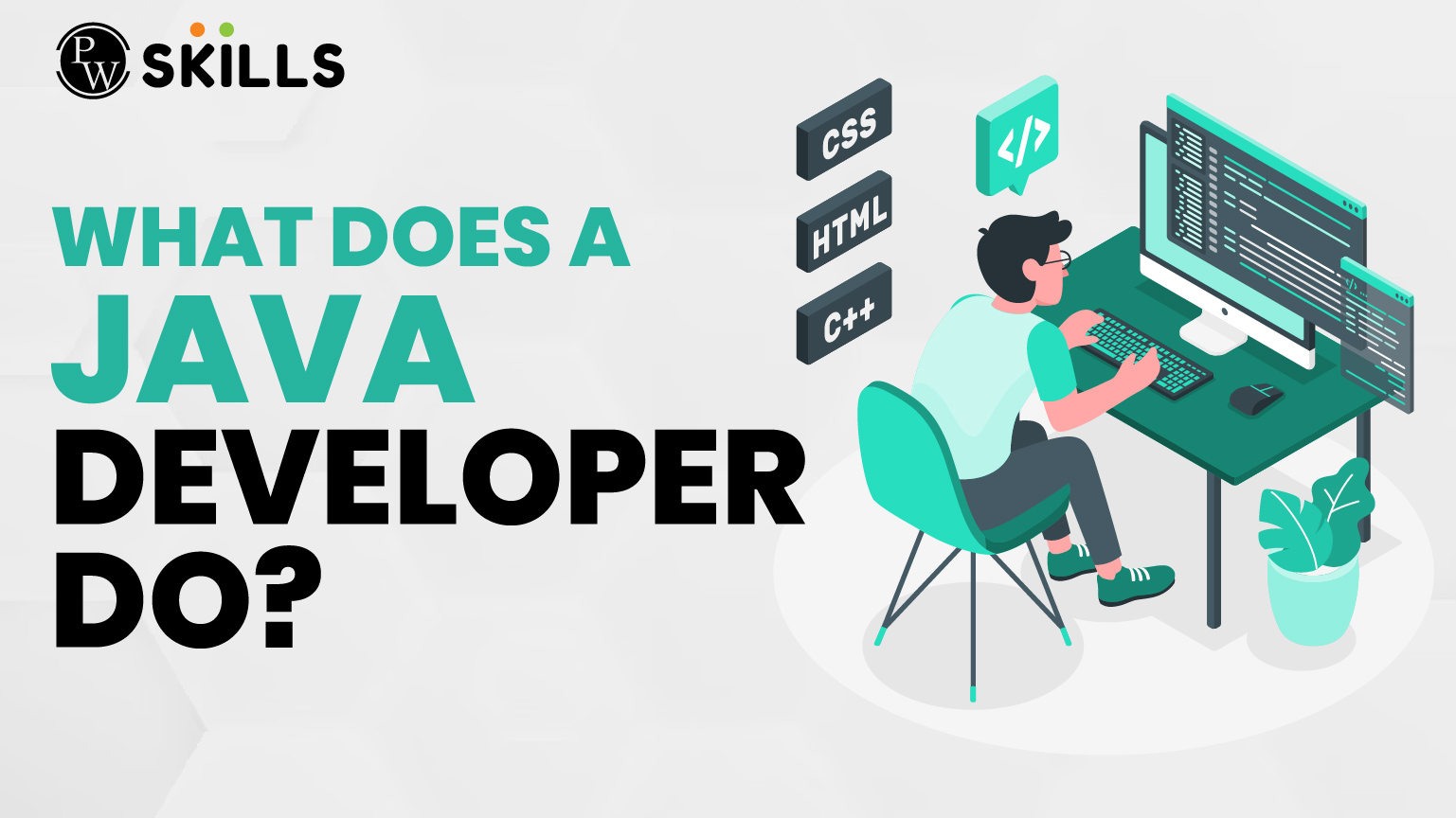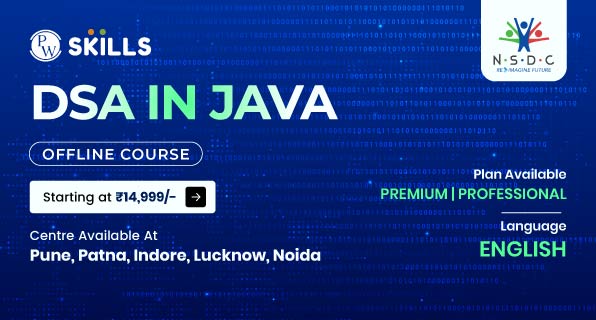If you want to learn about Java developers and the specifics of their work, you have arrived at the right website. Java has become quite a hot cake now, and whatever you see-from mobile apps to enterprise systems-it is powered by the skills of a Java developer. In this blog, we will explore what a Java developer does, essential Java developer skills, career opportunities, and specialization of a Java developer in different fields.
What is a Java Developer?
A Java developer is an individual who does all the software engineering processes that take place during Java development, after designing, such that application software is constructed and maintained. Java is one of the most commonly used programming languages because of the necessity for its versatility, security, and cross-platform working. A Java developer works on a mixture of applications, from web apps to backend systems, ensuring the smooth functionality and performance of those systems.
Like in most fields, there are also specializations among Java developers such as Android development, enterprise software, or cloud computing. Understanding what is a Java developer can help students or working professionals to make that informed decision about whether this career is suitable for them.
Core Responsibilities of a Java Developer
So, what does a Java developer actually do every day? Projects will have individual tasks, but some of the basic functions include writing good quality code, bug fixing on applications, and attending meetings with other developers. Apart from that, they are also looking into performance optimization, working with third-party services, and security compliance.
Another important area of a Java developer’s job is continually updating knowledge of the latest frameworks and tools. Since Java continues to keep evolving, one needs to catch up with the latest rapid technologies like Spring Boot, Hibernate, and also microservices architecture.
Key Responsibilities of a Java Developer – A Deep Dive
When people ask, “What does a Java developer do?”, the answer isn’t just about coding; it's about building resilient, scalable, and efficient software solutions. Java developers wear many hats, and their responsibilities go far beyond coding. Let’s see a few major responsibilities in detail.
- Writing and Maintaining Efficient Java Code
The core duty of a Java developer is to write code that is clean, optimized, and bug free. They always apply the OOP best practices to design modular and reusable components. Since Java is used in large-scale applications, a Java developer must make sure that their code is maintainable and properly documented for future updates.
- Debugging and Troubleshooting Applications
No software is perfect, and when something goes wrong, a Java developer is there to debug and fix it. Using Eclipse, IntelliJ IDEA, and logging frameworks (Log4j, SLF4J), they identify errors. Performance bottlenecks, memory leaks, and concurrent issues are all daunting problems that will test any Java developers problem-solving skills.
- Designing and Implementing APIs
These days, APIs have become the backbone of communication for modern applications among the services. A Java developer will work with RESTful and SOAP-based web services, usually with Spring Boot, and JAX-RS. Their role is to make sure that the APIs are secure, scalable, and well-documented for other developers to integrate easily.
- Database Integration and Management
A Java developer spends a good deal of time working with the database, writing SQL queries, and enhancing the efficiency of data retrieval. JDBC or Hibernate or JPA is used to connect the Java applications with the relational database (MySQL or PostgreSQL). In NoSQL applications, they work on managing unstructured data by using various interfaces, like MongoDB,Cassandra, or Redis.
- Application Security Maintenance
For developing software, securing the entire system is extensively cared for. Therefore, a Java developer would look toward implementing authentication (OAuth, JWT), encryption, and input validation to guard against vulnerabilities like SQL injection and cross-site scripting (XSS). Another interesting fact is that they usually research the security best practices to protect sensitive information.
- Performance Optimization
Slow-running applications deter users, so optimization for speed must be handled by performance tuning by the Java Developer. Thus, they closely look into CPU utilization, memory allocation, and garbage collection to obtain the further fine-tuning of applications. With the help of caching (Redis, Ehcache) and multithreads, speed and applications’ responsiveness can be increased.
- Collaboration within Cross-Functional Teams
A Java developer rarely works independently; he cooperates with frontend developers, QA engineers, DevOps specialists, and product managers. He takes a part in Agile scale/Scrum meetings, delivers technical knowledge, and assures the smooth integration of different components within the system.
- CI/CD Pipelines
These days, everything depends on automated processes. He sets up CI/CD pipelines for testing and deployment using automation tools such as Jenkins, Docker, and Kubernetes. The CI/CD pipeline ensures rapid deployment with the least amount of manual effort.
- Updating oneself with the world of Java
Java has always been changing. With new releases being introduced regularly (Java 17, 21) and newer frameworks popping up, there is a very slow influx of developers attempting to keep up with the ever-evolving ecosystem. A Java developer must always be updated and ready for the latest trends, libraries, and best practices to remain modern.
- Test Writing (Unit and Integration)
The motto in quality assurance is – The Java Developer writes Unit Tests with JUnit and Mockito so that the component gets an orderly pass upon working fine. After that, integration testing would be conducted to ensure that certain modules are working just as they should together.
Join our Full Stack Development Telegram channel for exclusive updates and tips!
The Expansive Role of a Java Developer: Beyond Just Coding
When one envisions the activities of a Java developer, they imagine someone with a keyboard passionately doing coding. Coding is key, but the meaning of the word Java developer these days is not just writing code; it includes lots of responsibilities that make their career quite dynamic and in demand.
- System Architecture and Design
Typically, a senior Java developer would take part in the design of the overall system architecture. This would involve:
- Choosing between monolithic or microservices architectures;
- Deciding on the relevant design patterns (MVC, Singleton, Factory);
- Consider server scalability right from the start;
- Making trade-offs amongst various technical approaches.
The architectural function thus requires knowledge in-depth of both the Java ecosystem and business requirements.
- Technical Leadership and Mentoring
Beyond coding and design, senior Java developers also have some leadership responsibilities. This typically involves:
- Mentoring junior developers with code reviews;
- Defining coding standards and coding practices;
- Conducting knowledge-sharing sessions;
- Onboarding new team members;
- Making pivotal technical decisions.
The mentoring role transforms a Java developer from an individual contributor into a high-velocity force multiplier for the whole team.
- Business Analysis and Requirements Gathering
Modern Java developers often work directly with stakeholders to:
- Translate business needs into technical specifications;
- Detect possible technical constraints at an early stage;
- Propose inventive solutions to business problems;
- Estimate project timelines and calculate resources;
This largely helps bridge the gap between technical and non-technical teams, thereby affording Java developers a vital role in ensuring project success.
- Performance Monitoring and Optimization
After deployment, the other duties expected to be fulfilled by a Java developer entail:
- Analyzing performance metrics of the application;
- Identifying memory leaks and fixing them;
- Optimizing database queries;
- Implementing caching strategies;
- Conducting load testing;
- Making recommendations on infrastructure improvements.
This performance optimization is an ongoing effort to keep applications performant and relevant as they grow.
- DevOps and Cloud Integration
The modern-day Java developer commonly interacts with DevOps to:
- Docker containerization;
- Kubernetes orchestration;
- Cloud deployment on AWS/Azure/GCP;
- Infrastructure as Code (IaC) with Terraform;
- CI/CD pipeline setup;
- Monitoring and alerting setup.
Such an expanded stack as per the above greatly augments the versatility of a modern Java developer.
- Research and Innovation
In this proactive spirit, a capable Java developer will devote time to:
- Evaluating new frameworks and tools;
- Prototyping solutions;
- Keeping current on Java updates,
- Investigating possibilities of AI/ML integration;
- Researching improvements in security;
- Testing the waters for new technologies.
Having a forward-thinking vision keeps both the developer and their organization competitive.
- Documentation and Knowledge Management
This often-overlooked but nonetheless important responsibility would include:
- Writing technical specifications;
- Maintaining API documentation;
- Creating system diagrams;
- Updating runbooks and operational guides;
- Preserving institutional know-how;
- Developing training materials.
Good documentation multiplies a Java developer’s impact across the organization.
- Quality Assurance and Testing
Besides unit tests, Java developers take an interest in:
- Writing integration tests;
- Setting up behavior-driven development;
- Configuring automated testing frameworks;
- Conducting penetration testing for security;
- Doing chaos engineering experimentation;
- Defining quality metrics.
This wide-ranging view of quality is the difference between good and awesome software.
- Production Support and Troubleshooting
When things fail, Java developers:
- Examine production logs;
- Debug complex distributed systems;
- Inject hotfixes;
- Carry out root cause analysis;
- Design mitigating factors;
- Contribute to on-call rotation.
This operationally ensures that developers get to appreciate the real-world impact of their code.
- Community Engagement and Open Source
Many top Java developers contribute by:
- Responding to Stack Overflow questions;
- Maintaining open-source projects;
- Presenting at conferences;
- Writing tech blogs;
- Partaking in Java User Groups;
- Mentoring outside the organization.
This community involvement benefits both personal and public growth.
Also Read:
- Java Certification Can Transform Your Tech Career: 4 Key Java Certifications
- Java Native Interface Explained: 14 Outstanding Components to Know
- 7 Key Concepts to Master Java Concurrency: A Human-Centric Tutorial
- Java Reflection & The Outstanding 3 Step Guide
Your Roadmap to Becoming a Java Developer
Becoming a Java developer is an exciting excursion involving learning core programming concepts, some practical experience, and constant upgrading of skills. The first step being the study of the fundamentals of Java, including OOP, data structures, and algorithms. Real projects, contributions to open-source projects, and solving various coding challenges on platforms like LeetCode and HackerRank will best hone your problem-solving skills.
To accelerate your learning process, opt for a structured course like PW Skills’ DSA with Java, which offers coverage of Data Structures, Algorithms, and advanced Java topics-basic knowledge for technical interviews and development roles. With larger connections, tech meetups, internships, and freelancing experiences will greatly accelerate your career.
The demand for Java developers with great skills will always be increasing. With hard work, the right resources, and some experience, you will be on your way to a rewarding career. Start coding, never give up, and enjoy your journey of becoming a Java wizard!
Join our Full Stack Development Telegram channel for exclusive updates and tips!
Yes! Java remains one of the most popular languages for enterprise applications, Android development, and cloud-based systems. Start with basics, practice coding daily, build projects, and take structured courses like PW Skills' DSA with Java for interview-ready skills. Core Java, OOP, Spring Framework, databases (SQL/NoSQL), REST APIs, and problem-solving with DSA (Data Structures & Algorithms) are essential.FAQs
Is Java still in demand in 2026?
How can I learn Java effectively?
What skills do I need to become a Java developer?


